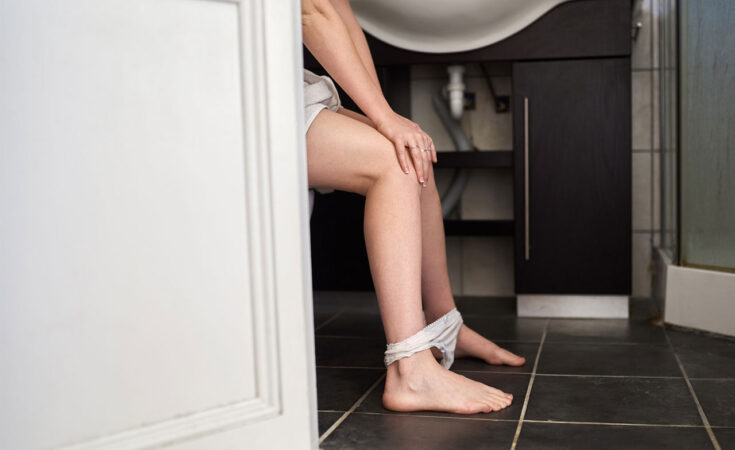Here’s the lowdown on pregnancy discharge: Why it happens, what it looks like, how to deal with it and when to get it checked by a doctor.
Pregnancy can be a “juicy” time—and we’re not talking about “is she or isn’t she?” gossip. Some women might notice extra saliva, a runny nose and, yes, more vaginal discharge. “It’s just a normal thing that happens during pregnancy,” says Kerry Harris, a midwife based in Vancouver. This milky-white pregnancy discharge is called leukorrhea and it is usually nothing to worry about. In fact, an increase in discharge is sometimes a clue that you’re pregnant! From there, it tends to increase more toward the end of the third trimester.
What is leukorrhea and what causes it?
Leukorrhea is the medical term for vaginal discharge. During pregnancy, many women find leukorrhea, or discharge, increases. You can thank your hormones: Your body’s increased levels of estrogen during pregnancy boosts blood flow to your pelvic area and stimulates your mucous membranes. The discharge does have a purpose, though. Harris says that it makes the vagina a “self-cleaning system,” helping to prevent infections by flushing away bacteria, keeping the vagina at a normal pH level and getting rid of dead cells.
Is discharge a sign of pregnancy?
After implantation, your body immediately begins to produce pregnancy discharge. However, because discharge fluctuates throughout the course of your cycle, you may not notice these subtle changes. On the other hand, if you’re monitoring your cycle closely and you notice an increase in discharge, it very well may be a sign that you’re pregnant!
What does normal pregnancy discharge look like?
Normal vaginal discharge in pregnancy is thin, milky white and mild-smelling or odourless. “Everyone’s got their normal, and that can increase in pregnancy,” says Harris. “If it changes from normal, that’s a good thing to talk about with your healthcare provider.”
When should I worry about discharge during pregnancy?
Yellow or green discharge
Any discharge that greenish or yellowish, causes vaginal itchiness or pain, smells bad or has a strong odour should be checked by your healthcare provider because it could signal an infection. This can be easily treated once a diagnosis is confirmed by your doctor or midwife.
Thick white clumpy discharge
Thick, cheesy-looking discharge is also a sign of infection. Make sure you get checked out by your health care provider.
Pink or brown discharge
Pinkish or brownish discharge is probably the result of mild bleeding from your cervix being bumped during sex or a vaginal exam. As long as it’s not heavy bleeding, all is probably well, but you can ask your healthcare provider if you have any concerns.
Watery discharge
If you have very watery discharge, contact your healthcare provider because it could mean that you are leaking amniotic fluid and need to be monitored.
How to tell if it’s discharge or the mucus plug?
When you’re pregnant, a thick plug of mucus blocks the cervix to stop bacteria from getting into the uterus. Toward the end of the third trimester, this plug may (or may not) move down into your vagina, resulting in more discharge that could be clear or tinged pink or brown if there’s blood in it—sometimes called a “bloody show.”
“All it means is that the cervix is starting to ripen and change and that the mucus that previously filled the cervix now has enough space to fall out,” says Harris.
The mucus plug is thicker or more jelly-like than normal pregnancy discharge, which is thin and milky-white.
How do I deal with discharge during pregnancy?
For most women, pregnancy discharge isn’t cause for concern and is just one of those oh-so-fun side effects of pregnancy. “I used panty liners through pretty much my whole pregnancy,” says Destinee Heikkenen, a mom of a four-month-old baby from Thunder Bay, Ontario. “I was a little surprised because I hadn’t noticed the discharge much with my other three kids, but my midwife assured me that everything was fine.”
Don’t use tampons, douches or vaginal washes or wipes because you don’t want to interfere with the natural balance of bacteria and pH levels in your vagina. If you want to go commando at home to help stay clean and dry, well, that’s a pregnant lady’s prerogative.
Your pregnancy week by week
Subscribe to our pregnancy newsletter for updates on baby’s development, how you’re feeling and what to expect next.



































